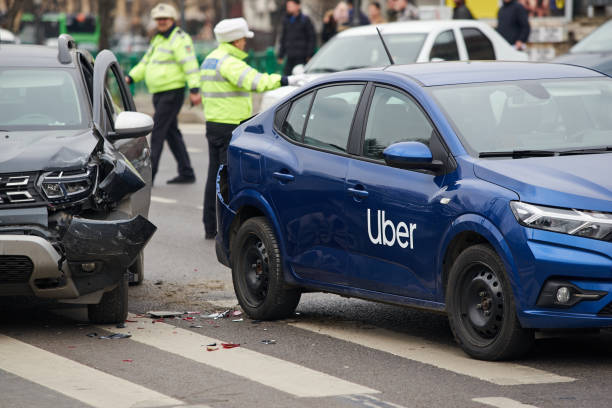Orange Rideshare Accident Lawyer
As winter settles over Orange, Boston Post Road (US‑1) becomes a narrow stage for rideshare transfers and sudden loss of traction. I’ve observed drivers and passengers negotiating black‑ice gloss where morning sun never reaches; a routine pickup can become a slow‑motion hazard as vehicles slide and reroute. That compressed local geography matters: small delays on this corridor cascade into later medical triage and longer waits for first responders.
On icy nights the injury patterns are blunt and repetitive: low‑speed sideswipes, pedestrian slips on untreated walks, and multi‑vehicle chain reactions producing whiplash, fractures and concussion. Orange Volunteer Fire Department crews often arrive before an ambulance can clear a slick approach, stabilizing patients and coordinating scene protection. Those initial on-scene decisions — sheltering hypothermic riders, choosing nearest open imaging — shape whether someone stays local or requires transfer to a higher-level center.
When urgent care clinics clog or roads are salted slowly, routine rideshare drop-offs near the Orange Center Historic District can turn into tricky logistics for follow-up care. A trip that started as a short ride sometimes ends with an EMS interfacility transfer because delayed imaging or orthopedic consultation isn’t available locally that night. Rehabilitation timelines shift accordingly: postponed PT, staggered home care visits, and longer courses of therapy when initial treatment is delayed by weather.
I’ve tracked cases where a few extra minutes on an icy curb changed a recovery path — not sensational, but consequential. For riders and drivers in Orange, winter timing affects everything from on-scene stabilization to the choice between local follow-up and an out-of-town rehabilitation program. My reporting spotlights practical realities: expect slower transports, potential interfacility transfers, and rehab delays when black ice forces medics to alter routes and schedules.
Do you need a Orange rideshare accident lawyer? If you or a loved one has been involved in an accident with an Uber, Lyft, or rideshare driver—whether as a passenger, another driver, or even a pedestrian—you have rights. Understanding these rights and navigating the complexities of rideshare accident claims requires the help of an experienced attorney. At Etemi Law, we are dedicated to helping victims of rideshare accidents receive the compensation they deserve.
Call us today at (203) 409-8424 for a


The Reality of Rideshare Accidents
Uber and Lyft have revolutionized transportation, providing millions of rides daily across the U.S. However, with the rise of these services, the number of rideshare-related accidents has also increased. Research from Rice University and the University of Chicago suggests that ridesharing services have contributed to a 2-3% increase in U.S. traffic fatalities since 2011, leading to up to 1,100 deaths annually.
Common Causes of Rideshare Accidents
Uber and Lyft drivers often operate under challenging conditions, increasing their risk of accidents. Some of the most common causes include:
- Distracted Driving – Relying on GPS, accepting ride requests, and managing passengers can divert a driver’s attention.
- Driver Fatigue – Many rideshare drivers work long hours or multiple jobs, leading to drowsy driving.
- Unfamiliar Routes – Navigating new areas can cause sudden stops or erratic driving behavior.
- Poor Vehicle Maintenance – Rideshare drivers are responsible for keeping their vehicles in good working condition, but lapses can lead to preventable accidents.
Connecticut Rideshare Laws and Regulations
Connecticut has strict laws governing rideshare companies and their drivers. These include:
- Mandatory Background Checks – Uber and Lyft must conduct background checks on all drivers, including a criminal record and driving history review.
- Vehicle Safety Requirements – Vehicles must pass inspections and meet specific safety criteria.
- Insurance Coverage – Rideshare companies must provide at least $1 million in liability coverage when drivers are transporting passengers.
- Driver Hour Limits – Uber and Lyft drivers can work a maximum of 14 consecutive hours and 16 hours in a 24-hour period to prevent fatigue-related accidents.
Who is Liable in a Rideshare Accident?
Determining liability in an Uber or Lyft accident can be complex, as multiple insurance policies may be involved. Our legal team at Etemi Law will investigate your case to establish liability and maximize your compensation.
If Another Driver is At Fault
- The at-fault driver’s insurance is the first line of compensation.
- If the at-fault driver is uninsured or underinsured, Uber/Lyft’s uninsured motorist coverage may apply.
If the Rideshare Driver is At Fault
- If the driver was logged into the app and waiting for a ride request, Uber/Lyft provides $50,000 per person/$100,000 per accident in bodily injury coverage.
- If the driver was transporting a passenger, Uber/Lyft provides $1 million in liability coverage.
- If the driver was off duty, their personal auto insurance applies.
Why You Need a Orange Uber and Lyft Accident Lawyer
Rideshare accident cases involve multiple insurance companies and complicated liability issues. Insurance companies often try to minimize payouts, but with an experienced attorney from Etemi Law, you can fight for the full compensation you deserve.
Our legal team will: ✅ Investigate the accident thoroughly ✅ Obtain key evidence, including rideshare records and driver logs ✅ Negotiate aggressively with insurance companies ✅ Take your case to court if necessary
Contact Etemi Law Today
If you or a loved one has been injured in an Uber or Lyft accident, don’t wait. Protect your rights and get the compensation you deserve. Contact Etemi Law today for a free consultation.
📞 Call us at (203) 409-8424 💻 Visit us online to schedule your case review


